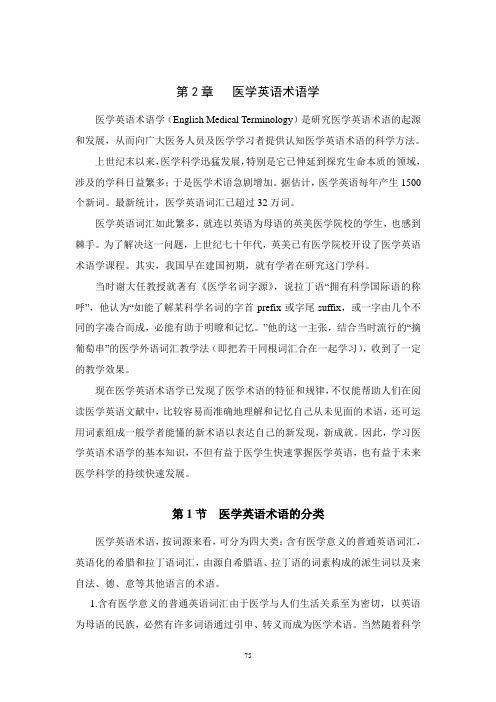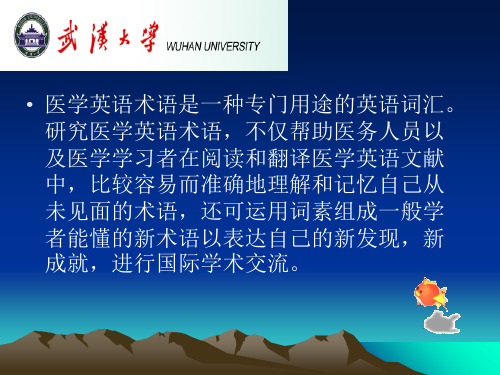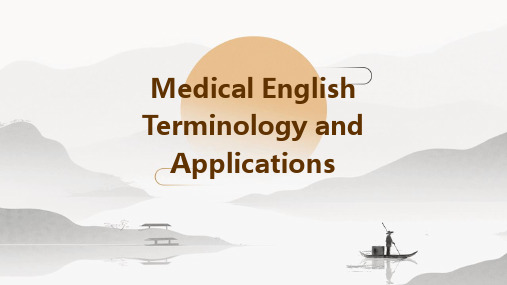医学英语术语学及应用复习课程
医学英语术语精品课件

xx年xx月xx日
目 录
• 医学英语术语概述 • 医学英语术语的发音和拼写 • 医学英语术语的学习和应用 • 医学英语术语的翻译和解释 • 医学英语术语的词汇和表达 • 医学英语术语精品课件总结与展望
01
医学英语术语概述
医学英语术语的特点
科学性和严谨性
医学英语术语表达准确、严谨,遵循科学原则。
02
学习医学英语术语的 语境含义
医学英语术语在不同的语境下可能有 不同的含义,学习这些不同含义及其 用法可以帮助学生更好地应用术语。
03
积累医学英语术语的 用法
医学英语术语的用法多且复杂,学生 需要不断地积累学习,建立自己的词 汇库,以便在需要时可以迅速查找和 使用。
医学英语术语在医学文献中的应用
注意字母组合
医学英语术语中的字母组合往往有一定的规律可循,如“-itis”、“-ectomy”等,掌握 这些组合可以帮助您更好地拼写医学英语术语。
习惯使用缩写
医学英语术语中有很多常用的缩写,如“CBC”、“AST”等,使用这些缩写可以提高书 写效率。
医学英语术语的常用缩写和符号
常用缩写
如AST(Aspartate Aminotransferase)、 ALT(Alanine Aminotransferase)、 CBC(Complete Blood Count)等。
词根和前缀
医学英语术语多基于拉丁语和希腊语词根、前缀,如 “cardio-”表示“心脏”,“-ectomy”表示“切除术 ”。
专业性强
医学英语术语通常只在医学领域使用,表达精确、专业 。
医学英语术语的表达方式和特点
缩写和简写
同义词和近义词
医学英语术语常采用缩写和简写形式 ,如“CAD”代表“冠状动脉硬化性 心脏病”。
医学专业英语术语课件

医学专业英语术语的未来发展趋势
05
医学专业英语术语的发展趋势
专业化趋势
医学专业英语术语不断细化,针对不同医学领域的术语不断涌现,如神经医学、肿瘤学、免疫学等。
随着医学科学的不断发展,新的医学概念和治疗方法不断出现,相应的医学英语术语也在不断更新换代。
医学专业英语术语的国际标准化趋势日益明显,如采用国际疾病分类标准(ICD)等。
冗长和复杂
医学术语往往较长且复杂,有时可能难以理解和记忆。
专业和领域特定
医学术语仅在医学领域使用,不与其他类型的英语混用。
01
02
03
用词差异
医学英语使用大量专业术语,而其他类型的英语可能不使用这些术语。
语法差异
医学英语经常使用复杂的句子结构和特定的语法,这可能与其他类型的英语不同。
语境差异
医学英语中的单词和短语通常只能在医学语境中使用,而其他类型的英语则不一定。
查阅词典
遇到不确定的医学英语术语时,应及时查阅权学专业英语术语的注意事项
注意文化差异
医学英语术语在不同文化背景下的表达可能存在差异,应注意跨文化交流中的术语使用。
关注更新和发展
医学专业英语术语会随着医学科学的发展而不断更新和变化,应注意关注最新动态和变化趋势。
重视术语的规范使用
医学专业英语术语有严格的规范和标准,应遵循规范使用原则,避免随意杜撰或篡改。
医学专业英语术语的应用场景及实例
04
医学专业英语术语在医学文献中广泛应用于描述疾病症状、病理生理过程、诊疗手段等。
例如,描述糖尿病的病理生理过程,会用到术语“insulin resistance”(胰岛素抵抗)。
医学文献交流
THANK YOU.
术语学习医学专业人员的必修课培训课件(精)

07
总结与展望
回顾本次培训内容
医学术语概述
介绍了医学术语的定义、分类、特点等基本概念,帮助学 员建立对医学术语的整体认识。
常见医学术语解析
详细解析了临床医学、基础医学、药学等领域的常见术语 ,包括疾病名称、药物名称、治疗手段等,提高学员对专 业词汇的理解和掌握。
医学术语学习方法与技巧
分享了医学术语学习的有效方法和实用技巧,如联想记忆 、对比记忆、实践应用等,帮助学员提高学习效率和应用 能力。
分享学习心得与体会
01
加深了对医学术语的理解和认识
通过本次培训,学员们普遍表示对医学术语有了更深入的理解和认识,
能够更准确地理解和使用专业词汇。
02
提高了医学术语的应用能力
通过学习和实践,学员们掌握了更多的医学术语,并能够在实际工作和
学习中加以应用,提高了自身的专业素养和综合能力。
03
增强了学习医学术语的兴趣和信心
加强实践和应用
学习医学术语不仅仅是为了应付考试或完成任务,更重要的是将其应用于实际工作中。建 议学员们多参与临床实践、科研项目等活动,将所学知识与实际工作相结合,提高实践能 力和解决问题的能力。
拓展学习领域和视野
除了临床医学和基础医学领域的术语外,还可以拓展学习药学、公共卫生、生物医学工程 等相关领域的专业词汇。建议学员们广泛涉猎不同领域的医学知识,拓宽自己的视野和知 识面。
议及预后评估。
06
实验诊断学专业术语学习
实验诊断学基本概念及原理
实验诊断学定义
实验诊断学是研究诊断疾病的方法和理论的学科,通过实验 室检测和分析,为临床医生提供疾病诊断、治疗监测和预后 评估的依据。
实验诊断学原理
实验诊断学基于生物医学、临床医学、检验医学等多学科知 识,运用各种实验技术手段,对疾病进行定性、定量或半定 量的检测和分析,从而揭示疾病的本质和规律。
医学英语术语学及应用ppt课件

Old English (450 -1100)
The invader’s language , Anglo-Saxon, developed into what we know as Old English
water, stone, foot, fire, sheep, and strong derive from Old English roots
Horsepower, airplane, typewriter (English roots)
This burst of neologism continues today, visible in the field of electronics and computers: cyber-, bios, hard-drive, and microchip
Of all the different branches in IndoEuropean family, two are of paramount importance, the Germanic and the Romance. English is in the Germanic group of languages.
7
The Norman Conquest and Middle English (1100 -1500)
William the Conqueror, the Duke of Normandy, subsequently King William I, invaded and conquered England and the Anglo-Saxons in 1066. They spoke a dialect of Old French known as Anglo-Norman. The Normans were also of Germanic stock and Anglo-Norman was a French dialect that had considerable Germanic influences in addition to the basic Latin roots.
医学英语术语及应用

医学英语术语及应用医学英语术语是指在医学领域中使用的特定术语和短语。
这些术语通常是拉丁语或希腊语来源,用于描述疾病、诊断、治疗和解剖学等方面的概念。
医学英语术语对于医学专业人士来说至关重要,因为它们可以提供准确的描述和交流。
以下是一些常见的医学英语术语及其应用:1. Diagnosis(诊断):指确定疾病或病因的过程。
医生会使用一系列的临床检查、症状观察和医学测试来进行诊断。
2. Treatment(治疗):指用药物、手术或其他方法来治疗疾病或症状的过程。
治疗的目标是恢复患者的健康状态。
3. Symptoms(症状):指患者出现的主观感觉或病理上的变化。
症状通常是疾病的一个信号,可以帮助医生进行正确的诊断。
4. Anatomy(解剖学):指人体内部结构和器官的科学研究。
医生需要了解人体的解剖学知识,以便更好地理解疾病和进行手术。
5. Physiology(生理学):指人体内各器官和系统的正常功能和机制。
了解生理学可以帮助医生更好地理解疾病的发生机制。
6. Laboratory Tests(实验室测试):指通过检查血液、尿液、组织样本等来评估患者的健康状况和诊断疾病。
7. Prescription(处方):指医生为患者开出的药物治疗的指示。
处方通常包括药物的名称、剂量、用法和用药频率。
8. Surgery(手术):指通过切口或其他操作来修复组织或器官的过程。
外科手术通常需要麻醉和显微镜等特殊设备。
9. Radiology(放射学):指使用X射线、MRI、CT扫描等放射技术来检查和诊断疾病。
这些技术可以提供内部器官的影像。
10. Pathology(病理学):指对疾病发生和病变机制进行研究的科学。
病理学家通过组织样本的检查来确定疾病的类型和严重程度。
医学英语术语的应用非常广泛,不仅限于医生和护士之间的交流,还包括医学文献的阅读和翻译、研究工作的报告以及与患者进行沟通。
在与患者交流时,医生需要使用简单且易于理解的词汇解释疾病和治疗方法,以确保患者充分理解和参与治疗决策。
最新医学英语词汇讲解精品课件

• in consultation with 经与…磋商
• technical consultation 技术咨询 psychological consultation 心理咨询
consultation company 咨询公司
第七页,编辑于星期六:十二点 五十七分。
unit 24 depression
• alcohol 酒精 • holic 中毒,沉迷于某事
ห้องสมุดไป่ตู้
• alcoholic beverage 酒精饮料
• alcoholic fermentation [化]酒精发酵 alcoholic liquor [医]醇制溶液;含醇液 alcoholic extract 酒精提出物,酒精萃取物 alcoholic hepatitis 酒精性肝炎
第十一页,编辑于星期六:十二点 五十七分。
shaggy
• Shaggy hair or fur is long and messy. (毛发 等) 又长又乱的
第十二页,编辑于星期六:十二点 五十七分。
tend伸出头探望ian表示人称名词physicianintern实习医生doctorcharge主治医生risidentphysician住院医生chiefresident主任医生alcoholalcohol酒精holic中毒沉迷于某事alcoholicbeverage酒精饮料alcoholicfermentation化酒精发酵alcoholicliquoralcoholicextract酒精提出物酒精萃取物alcoholichepatitis酒精性肝炎alcoholismpeoplewhosufferfromalcoholismcannotstopdrinkinglargequantitiesism行为状态chronicalcoholism慢性酒中毒
第2章 医学英语术语学

第2章医学英语术语学医学英语术语学(English Medical Terminology)是研究医学英语术语的起源和发展,从而向广大医务人员及医学学习者提供认知医学英语术语的科学方法。
上世纪末以来,医学科学迅猛发展,特别是它已伸延到探究生命本质的领域,涉及的学科日益繁多;于是医学术语急剧增加。
据估计,医学英语每年产生1500个新词。
最新统计,医学英语词汇已超过32万词。
医学英语词汇如此繁多,就连以英语为母语的英美医学院校的学生,也感到棘手。
为了解决这一问题,上世纪七十年代,英美已有医学院校开设了医学英语术语学课程。
其实,我国早在建国初期,就有学者在研究这门学科。
当时谢大任教授就著有《医学名词字源》,说拉丁语―拥有科学国际语的称呼‖,他认为―如能了解某科学名词的字首prefix或字尾suffix,或一字由几个不同的字凑合而成,必能有助于明瞭和记忆。
‖他的这一主张,结合当时流行的―摘葡萄串‖的医学外语词汇教学法(即把若干同根词汇合在一起学习),收到了一定的教学效果。
现在医学英语术语学已发现了医学术语的特征和规律,不仅能帮助人们在阅读医学英语文献中,比较容易而准确地理解和记忆自己从未见面的术语,还可运用词素组成一般学者能懂的新术语以表达自己的新发现,新成就。
因此,学习医学英语术语学的基本知识,不但有益于医学生快速掌握医学英语,也有益于未来医学科学的持续快速发展。
第1节医学英语术语的分类医学英语术语,按词源来看,可分为四大类:含有医学意义的普通英语词汇,英语化的希腊和拉丁语词汇,由源自希腊语、拉丁语的词素构成的派生词以及来自法、德、意等其他语言的术语。
1.含有医学意义的普通英语词汇由于医学与人们生活关系至为密切,以英语为母语的民族,必然有许多词语通过引申、转义而成为医学术语。
当然随着科学的普及,人民知识水平的提高,也必有部分医学术语融入普通词汇。
因此,有一部分普通词汇含有医学意义。
如:这类词语的一般意义,完成大学英语四、六级的学生,多已通晓,但在医学专业英语中的含义,如未掌握,阅读时一定会感到困惑或误解。
医学课件医学英语术语

• di-两 cephal形
+ -ia病态 → dicephalia 双头畸
• 这组同族词告诉我们,词根在一个术语意 义中的地位很重要,好像句子里的主语, 前缀和后缀只是修饰说明词根的。因此, 一个人的医学英语术语库有多大,在很大 程度上取决于他掌握词根的情况。如何获 得词根,有几种方法:
• (1)在同根词中找出共有的、可以辨认的 部分。例如在central(中心的),concentrate (集中,浓缩),eccentric(离心的), concentric(同心的),decentration(偏心), polycentric(多中心的)等词中,都含有centr, 其意义为“中心”,于是就确定centr-为词 根。
循的。绝大多数医学术语是由一些词素按一定的 构词规律构成的派生词和复合词。
• 虽然医学术语冗长、难认、难读、 难记,给医务人员阅读,翻译和写 作带来了很大困难,但其构词、读 音和拼写是有规律可循的。绝大多 数医学术语是由一些词素按一定的 构词规律构成的派生词和复合词。
• 如果一个医务人员能掌握他所从事的专业 中常见的500-600个词素,熟练运用医学英 语术语词素分析法(the morpheme analyzing process)和词素合成法(the morpheme combining process),就能在
词根变化 方式
单数主 词根 格词 尾
-tio
-tion
-mo
-mon
-do
-din
-go
-gin
-ma
-mat
-x
-c
但-ex -ic
-men -min
-ut
-it
例
词
单数主格
单数属格 词根
医学英语术语及应用第一章前缀prefixes kindle适用

医学英语术语学及应用必背单词表第一章前缀Prefixes 一、表位置ad- toward向……ab- away from, off离开……af- towardef- out of, fromante- forward, before前antebrachium前臂antecardium上腹部retro- backward, or located behind后retrocervical颈后的cervix颈anter/o- farther forward更前poster/o- farther back更后dextr/o- on the right side右dextrocardia右位心extra/o- outside of, beyondIntra/o- inside, withinInfer- lower低、下Super- above, over, higher高、上Infra- inferior to, below, or beneathInfracostal肋下的Supra- above, oversupracostal肋上的Hyper- over, above, beyond; excessive Hypo- beneath, underEndo- inside, innerExo- out of, outsideCircum- around, encircling周围Co- with, togethercoenzyme辅酶De- down from, away from, offdif- apart, separate散开,传播Dis- apart, separateEn- in, on, withinEpi- upon, above, or besideIn- in, into, on, toward, againstOb- against, in the way ofPer- through, throughout穿过Re- back, againsub- undersyn- with, together, fusedsynthesis合成Trans- across, through, beyond, overTranscutaneous经皮的Ultra- beyondAnti- against, opposing, or oppositeDia- through; thorough, thoroughly; apart Ecto- outside of, outerectoderm外胚层Mes/o- in the middle, intermediate, or moderatePara- beside, by the side of, beyondparathyroid甲状旁腺peri- around周围pericardium心包膜Tele- far away, at a distance远二、表否定A-/an- not, without, absence ofapnea呼吸暂停anemia贫血De- do or make the opposite of; reverse;Remove fromdehydration脱水Dis- not; the converse ofdyspepsia消化不良dyspnea呼吸困难In-, il-, ir-, im-, notNon- notNon-infectious非传染性的Un- not三、表数量①uni-, haplo-Haploid单倍体②bi-, di-, diplo-,Biceps二头肌③tri-, ter-,Teroxide三氧化物④quadri-, quadru-, quadr-, tera-Quadriceps四头肌tetraplegia四肢麻痹⑤penta-Pentagan五角大楼⑩deca-Deci- tenthdecimeter分米Oligo- little, few少Poly- much, many多Plur- more than oneMulti- many; much; multipleHolo- wholePan- all全四、表颜色白alb/i-, albino/o-, album/o- albino白化病患者Leuk/o-, leuc/o-leukemia白血病绿chloro-chlorophyll叶绿素红erythr/o-erythrocyte红细胞Rub-, rubi-, rube/o-bilirubin胆红素蓝cyan/o-Cyanosis发绀,紫绀灰glauc/o-glaucoma青光眼黑melan/o-黄xanth/o-Xanthoderma黄皮病五、其他Brachy- shortBrady- slowbradypnea呼吸过缓tachypnea呼吸过速Hetero- other; differentHomo-, homeo, homio- same; likeMal- bad, badly; abnormal, abnormallymalnutrition营养不良Eu- 好的,与mal- 相对euthanasia安乐死。
医学英语术语学及应用

02
Medical students and professionals need to have a solid understanding of Medical English Terminology to learn and apply medical knowledge effectively
Blending
combining the sounds or meanings of two or more words to create a new word, such as "radiapy" (combining "radiation" and "therapy")
Acronymy
Creating a word from the initial letters of a phrase or group of words, all as AIDS
Affix
a prefix or suffix that modifies the meaning of a root word, such as "- economy" in "appendix"
Compound
a combination of two or more words that form a new meaning, such as "heart disease"
Learning advanced medical concepts: By reading medical literature, one can learn international advanced medical concepts and diagnosis and treatment ideas, understand the latest medical development trends, and provide guidance for clinical work.
《医学英语术语》ppt课件-文档资料99页

• 11. 1 医学英语术语词素 • 根据构词法,组成单词的要素,即用以构成单词
的有意义的音节,叫做词素(morpheme或wordelement)。词素可分为词根(root, base),连 接元音(connective or combining vowel),组合形 式(combining form),前缀(prefix),后缀 (suffix)。以endo/crin/o/logy为例,endo是前缀, crin是词根,o为连接元音,crino为组合形式, logy是后缀。 • 11. 1. 1 词根 词根是一个术语最根本的成分,它 构成该术语的语义核心。下面是以cephal- 为词根 的一组同族词(cognate words)。
• 医学英语术语中的前缀主要源于古希腊语 和拉丁语的介词、部分数词或表示态度的 词。由于长期放在词根前使用,它们便失 去了独立作用而成为前缀。
• 11. 1. 3 后缀 后缀是附加在词根后的词素。
• (1)纯后缀 在普通英语构词中,后缀一 般不改变词的含义,只表示其词类。这种 后缀叫纯后缀(real suffix). 医学英语中,也 有纯后缀, 但数量较少,一般是从古希腊语 和拉丁语移入的或转化的。
• (2)去掉医学英语术语的古希腊语或拉丁语前缀、 后缀及连接元音。例如:viricide(杀[病]毒剂)去掉 后缀-cide(杀…)和连接元音-i-,就得词根vir(病毒、毒);同样将antivirin(抗病毒素)去掉前缀 anti-(抗)和后缀-in(…素)也可得词根vir-(病毒)。这 是从现有词汇中获得词根的常见方法。
• 前缀 +词根 +连接元音+ 后缀 → 全词
词义
医学专业英语词汇培训ppt课件

医学专业英语词汇
15
Word Urology泌尿学
Root ur(ine)
Irotomy虹膜切开术 ir(is)
pericardiotomy 心包 cardio 切开术
nephrotomy肾切开术 nephr
Meaning
waste, fluid, acid product secreted by the kidneys
humerus ( fossa (窝) 肱骨)
tonus (肌肉 的强直性, 强直 性痉挛)
医学专业英语词汇
6
l capita (头) l cervix (颈) l bronchus (支气管) l Abdomen腹部,腹腔 l brachium (臂) l aorta (主动脉) l os (骨)
l also called duplication.
l use both Greek and Latin as sources for medical word bases .
three types of competing forms :
l 1 ) those that have the same base but different combing vowels;
医学专业英语词汇
20
para (beside, near)
paramedical (准医学的) anti(against) antibiotic (抗生素)
antipyretic ( 退 热 剂 )
syn, sym, syl ( together, with)
syndrome (综合症)
symbiosis (共生)
l infra ( below, beneath) infrasonic ( 听 阈 下 的 )
医学英语考试复习资料

医学英语考试复习资料一、词汇医学英语词汇量大且专业性强,是复习的重点之一。
1、词根词缀许多医学词汇都由词根、前缀和后缀组成。
例如,“cardio”表示“心脏”,“itis”表示“炎症”,那么“carditis”就是“心肌炎”。
了解常见的词根词缀可以帮助我们推测和记忆生词。
2、专业术语掌握常见的医学专业术语,如解剖学、生理学、病理学、药理学等方面的词汇。
例如,“anatomy(解剖学)”“physiology(生理学)”“pathology(病理学)”“pharmacology(药理学)”等。
3、缩略词医学领域中有大量的缩略词,如“ECG(心电图)”“MRI(磁共振成像)”“ICU(重症监护病房)”等。
需要熟悉这些缩略词的全称和含义。
二、语法1、名词的单复数医学英语中名词的单复数形式有其特殊规则。
例如,“bacterium(细菌,单数)”“bacteria(细菌,复数)”。
2、动词时态在描述医学研究、病例报告等时,要正确使用动词的时态,一般过去时和现在完成时较为常见。
3、被动语态由于医学研究和实践中更强调客观事实,被动语态的使用较为频繁。
三、阅读1、医学文献阅读医学期刊、研究报告等,提高对专业文章的理解能力。
注意文章的结构、段落主旨和关键词。
2、病例分析通过阅读病例分析,了解医学英语在实际临床中的应用,同时熟悉相关的疾病名称、症状描述和治疗方法。
四、写作1、医学报告练习撰写医学报告,包括病例报告、实验报告等,注意格式规范、语言准确和逻辑清晰。
2、摘要写作学会提炼医学文献的主要内容,写出简洁准确的摘要。
五、听力1、医学讲座收听医学专业的讲座录音,提高听力理解能力,熟悉医学领域的常用表达和发音。
2、模拟听力测试进行模拟听力测试,熟悉考试题型和节奏。
六、口语1、医患对话模拟医患之间的对话场景,练习用医学英语进行交流。
2、学术讨论参与医学英语的学术讨论,锻炼表达观点和回应他人的能力。
七、常见疾病和症状的表达1、心血管疾病如“heart attack(心脏病发作)”“hypertension(高血压)”“atherosclerosis(动脉粥样硬化)”等。
医学英语术语实用教程

医学英语术语实用教程
本教程旨在帮助学习英语的医学专业学生及从事医疗工作的医护人员更好地掌握医学英语术语,提高其英语沟通和理解能力。
本教程包括以下几个方面的内容:
一、常见疾病的英语术语:介绍常见疾病的名称、症状、诊断方法和治疗方法等方面的英语术语,帮助学生和医护人员更好地掌握相关的专业知识。
二、人体器官和组织的英语术语:介绍人体各个器官和组织的名称和功能,帮助学生和医护人员更好地理解相关的医学文献和诊断报告。
三、药物和治疗方法的英语术语:介绍常见药物的英文名称、作用和用法,以及各种治疗方法和手术的英语术语,帮助学生和医护人员更好地了解相关的医疗知识。
四、医学研究和技术的英语术语:介绍医学研究和技术领域的英语术语,包括医学统计学、生物医学工程、医学影像学等方面的词汇,帮助学生和医护人员更好地了解相关的前沿技术和研究成果。
五、临床常用表达和常见医学缩略语:介绍临床常用的英语表达和常见的医学缩略语,帮助学生和医护人员更好地进行英语交流和理解医学文献和报告。
- 1 -。
医学英语术语学及应用 ppt

Neologism :oxygen, protein, nuclear, vaccine (Latin /Greek roots)
-
11
Late Modern English (1800 - Present)
Horsepower, airplane, typewriter (English roots)
This burst of neologism continues today, visible in the field of electronics and computers: cyber-, bios, hard-drive, and microchip
-
7
The Norman Conquest and Middle English (1100 -1500)
William the Conqueror, the Duke of Normandy, subsequently King William I, invaded and conquered England and the Anglo-Saxons in 1066. They spoke a dialect of Old French known as Anglo-Norman. The Normans were also of Germanic stock and Anglo-Norman was a French dialect that had considerable Germanic influences in addition to the basic Latin roots.
医药英语课件(医学英语培训教材,全英文PPT)

欢迎来到医药英语课件!通过本课件,您将学习医学术语和词汇、解剖学和 生理学基础、常见的医学缩写和符号等。
Introduction to Medical Terminology and Vocabulary
了解医学术语和词汇的基本概念,学习如何正确使用和解释医学术语,提高 医学英语水平。
学习诊断和治疗计划的基本原则和步骤,了解常见疾病的诊断流程。
Drug Classification and Pharmacology
了解药物分类和药理学基础,学习不同药物的作用机制和临床应用。
Drug Administration Methods and Techniqu。
Anatomy and Physiology Basics
了解人体解剖学和生理学的基本知识,掌握不同身体系统的结构和功能。
Common Medical Abbreviations and Symbols
学习常见的医学缩写和符号,掌握在医学文档和交流中正确使用和解读缩写和符号。
Diagnosis and Treatment Planning
Common Medical Procedures and Techniques
学习常见的医疗程序和技术,包括手术、检查和治疗方法。
Medical Imaging and Radiology
了解医学影像学和放射学的基本原理,学习不同医学影像技术的应用。
医学英语术语学及应用课件

The Norman Conquest and Middle English (1100 -1500)
William the Conqueror, the Duke of Normandy, subsequently King William I, invaded and conquered England and the Anglo-Saxons in 1066. They spoke a dialect of Old French known as Anglo-Norman. The Normans were also of Germanic stock and Anglo-Norman was a French dialect that had considerable Germanic influences in addition to the basic Latin roots.n Etymological (词源的 ) Study of English Language
Indo-European and Germanic Influences
English belongs to the Indo-European family of languages, a very broad language family including most of the European languages spoken today.
The Norman Conquest and Middle English (1100 -1500)
The influence of the Normans: beef and cow
Beef → Anglo-Norman Cow → German The mixture of the two languages: Middle
- 1、下载文档前请自行甄别文档内容的完整性,平台不提供额外的编辑、内容补充、找答案等附加服务。
- 2、"仅部分预览"的文档,不可在线预览部分如存在完整性等问题,可反馈申请退款(可完整预览的文档不适用该条件!)。
- 3、如文档侵犯您的权益,请联系客服反馈,我们会尽快为您处理(人工客服工作时间:9:00-18:30)。
Old English (450 -1100)
The Angles,Germany, Denmark and northern Holland invaded British Isles and began to populate those areas.
Two historical factors: Industrial Revolution and the British Empire
Neologism :oxygen, protein, nuclear, vaccine (Latin /Greek roots)
Late Modern English (1800 - Present)
The word for father vater (in German), pater (in Greek), pedar in (Persian), pater (in Latin), and pitr (in Sanskrit)
Indo-European and Germanic Influences
The Norman Conquest and Middle English (1100 -1500)
William the Conqueror, the Duke of Normandy, subsequently King William I, invaded and conquered England and the Anglo-Saxons in 1066. They spoke a dialect of Old French known as Anglo-Norman. The Normans were also of Germanic stock and Anglo-Norman was a French dialect that had considerable Germanic influences in addition to the basic Latin roots.
William Shakespeare
Late Modern English (1800 - Present)
The principal distinction between Early Modern English and Late modern English is vocabulary.
Old English (450 -1100)
The invader’s language , Anglo-Saxon, developed into what we know as Old English
water, stone, foot, fire, sheep, and strong derive from Old English roots
Anglo-Saxons
Old English (450 -1100)
the original, Celtic-speaking inhabitants → out of what is know England → Scotland, Wales, Cornwall and Ireland, leaving behind a few Celtic words.
English
Early Modern English (1500 -1800)
The next wave of innovation in English came with the Renaissance. Many classical Latin and Greek words were brought into the Language: grammar, logic, arithmetic, geometry, astronomy, and music
In case of the word “brother”, it is of similar nature. In Greek it is phrater, in Latin frater, in Sanskrit bhratar, in French frere and in German bruder
Horsepower, airplane, typewriter (English roots)
This burst of neologism continues today, visible in the field of electronics and computers: cyber-, bios, hard-drive, and microchip
Of all the different branches in IndoEuropean family, two are of paramount importance, the Germanic and the Romance. English is in the Germanic group of languages.
医学英语术语学及应用
Chapter One
An Etymological (词源的 ) Study of English Language
Indo-European and Germanic Influences
English belongs to the Indo-European family of languages, a very broad language family including most of the European languages spoken today.
The Norman Conquest and Middle English (1100 -1500)
The influence of the Normans: beef and cow
Beef → Anglo-Norman Cow → German The mixture of the two languages: Middle
